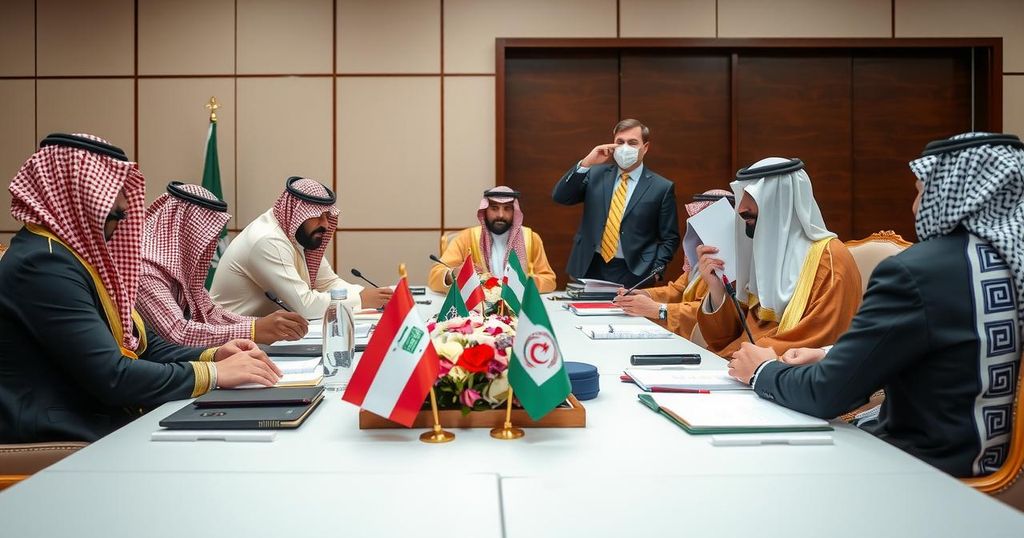Western and Arab foreign ministers met in Riyadh to discuss Syria’s future following President Bashar al-Assad’s removal. The discussions centered on lifting sanctions to facilitate humanitarian aid and economic recovery, amid calls from Syria’s new Foreign Minister for resource accessibility. The meeting underscored a potential policy shift by Western nations towards easing sanctions while balancing ongoing concerns over previous regime collaborators.
A high-profile gathering of foreign ministers and senior diplomats from Western and Arab nations took place in Riyadh to deliberate the future of Syria following the recent ousting of President Bashar al-Assad. The meeting marks a significant shift in diplomatic engagement with Syria, featuring the participation of Syria’s new Foreign Minister Asaad Hassan al-Shaibani, who advocates for the lifting of long-standing sanctions. Diplomats from Saudi Arabia, Egypt, the United Arab Emirates, Qatar, Bahrain, Iraq, Jordan, Lebanon, and Turkiye articulated their positions, alongside representatives from the United States, Germany, and Britain.
The discussions focus on potential sanctions relief to enable humanitarian aid and support economic recovery in Syria, as urged by the new governing authority, Hayat Tahrir al-Sham (HTS). Analysts, including Rob Geist Pinfold of King’s College London, suggest a possible shift in U.S. and European policy toward relaxing sanctions. A recent U.S. exemption facilitates transactions with Syrian governing institutions, emphasizing international aid.
While the call for easing sanctions aligns with the new administration’s needs, key nations, including Germany and France, remain committed to maintaining sanctions against individuals associated with al-Assad’s previous regime. This meeting is pivotal as it outlines a regional consensus on addressing sanctions while paving the way for Syria’s potential rehabilitation on the international stage. The conclusion is that future decisions will require consensus among European Union members, ensuring a balanced approach to sanctions relief amid ongoing humanitarian concerns.
The context of this significant diplomatic engagement stems from the recent political upheaval in Syria, marked by the ousting of President Bashar al-Assad. This event has reshaped both the internal landscape of the country and its relations with international actors. The newly formed Syrian government, led by the HTS, seeks to foster international cooperation and aid through the lifting of long-established sanctions that have hampered economic recovery and humanitarian efforts. The meeting in Riyadh serves as a decisive platform for discussing these issues, emphasizing the role of diplomatic collaboration in the context of upheaval in one of the Middle East’s most complex crises.
The gathering of Western and Arab leaders in Riyadh reflects a critical juncture in Syria’s political landscape following the removal of al-Assad. The emphasis on sanctions relief signals a noteworthy shift in diplomatic strategies aimed at facilitating humanitarian aid and economic stability in Syria. While some nations advocate for the lifting of certain sanctions, others remain cautious, maintaining restrictions on those tied to the previous regime’s actions. The outcome of such meetings will significantly influence Syria’s path towards recovery and international reintegration.
Original Source: www.aljazeera.com






